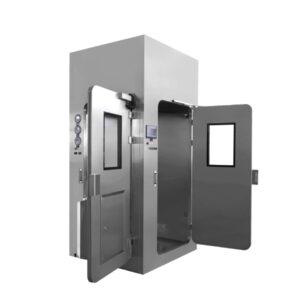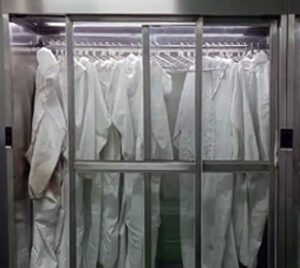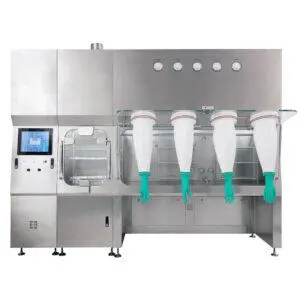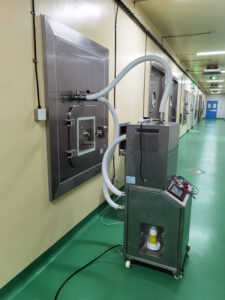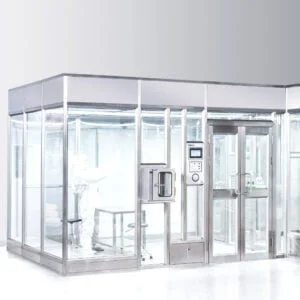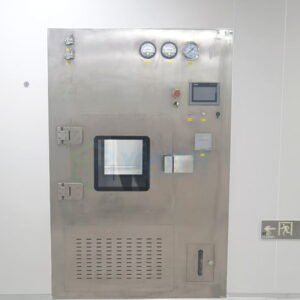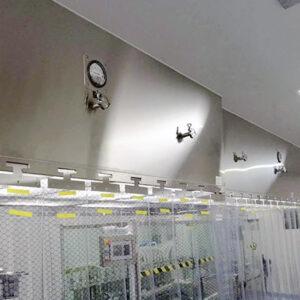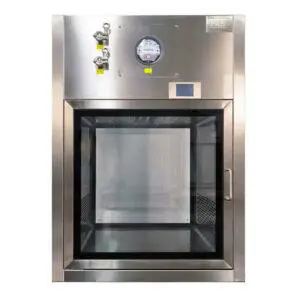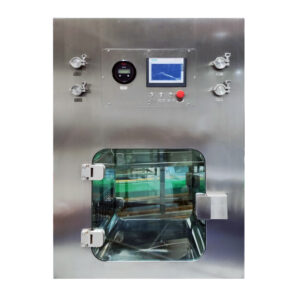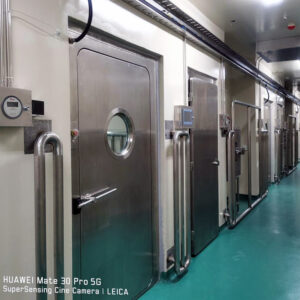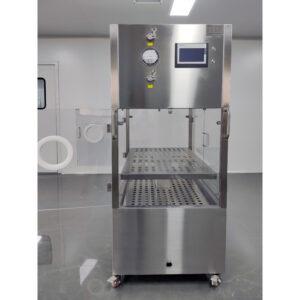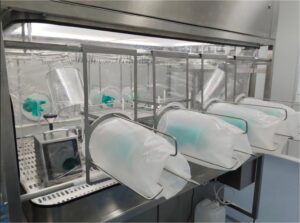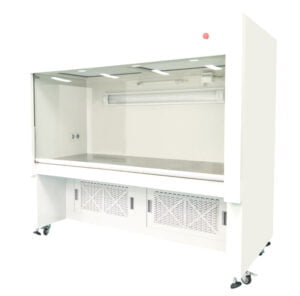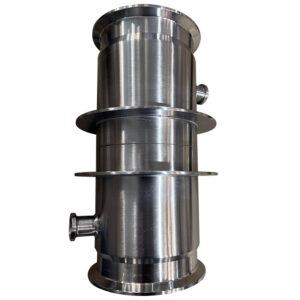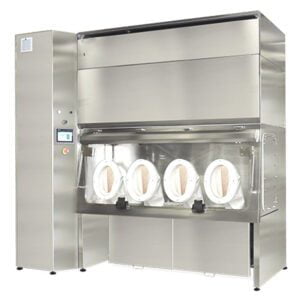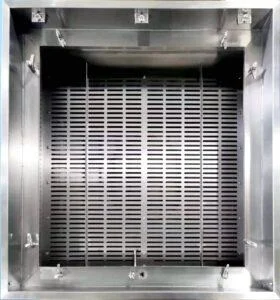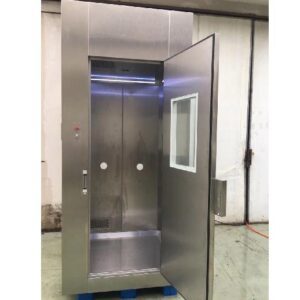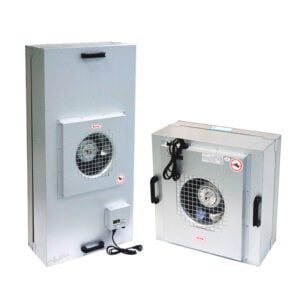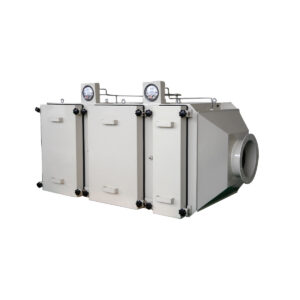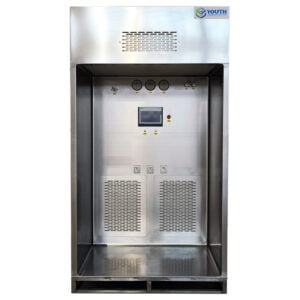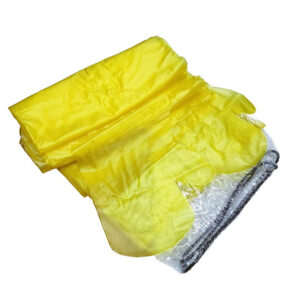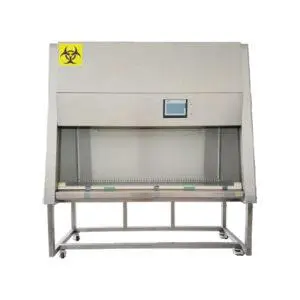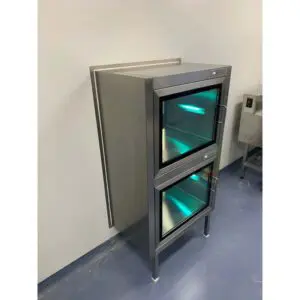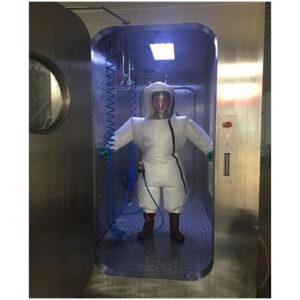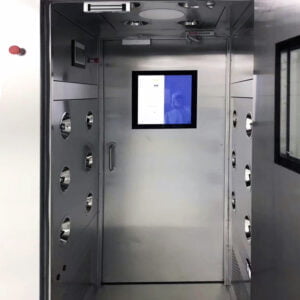ISO 5 / Class 100 certification is a critical standard in the world of cleanroom technology, ensuring the highest levels of cleanliness and contamination control. As industries ranging from pharmaceuticals to semiconductors demand increasingly stringent environmental controls, the importance of certified mobile laminar airflow (LAF) carts has grown exponentially. These versatile units provide localized clean environments that meet or exceed ISO 5 / Class 100 standards, offering flexibility and precision in cleanroom operations.
In this comprehensive guide, we'll explore the intricacies of ISO 5 / Class 100 certification for mobile LAF carts, delving into the requirements, benefits, and applications of these essential cleanroom tools. From understanding the certification process to implementing best practices for maintenance and operation, we'll cover everything you need to know to ensure your mobile LAF carts meet the highest industry standards.
As we navigate through the complexities of ISO 5 / Class 100 certification, we'll examine the key factors that contribute to achieving and maintaining this level of cleanliness. We'll discuss the role of HEPA filtration, airflow patterns, and particle monitoring in creating a controlled environment that meets the stringent requirements of ISO 5 / Class 100 standards. Additionally, we'll explore the various industries that rely on these mobile clean air solutions and how they integrate into broader cleanroom operations.
The journey to ISO 5 / Class 100 certification is one of precision, dedication, and continuous improvement. Let's embark on this exploration of mobile LAF carts and their pivotal role in maintaining the highest standards of cleanliness in critical environments.
ISO 5 / Class 100 certification for mobile LAF carts ensures a controlled environment with less than 100 particles per cubic foot of air, or 3,520 particles per cubic meter, sized 0.5 μm and larger, providing a level of cleanliness essential for sensitive processes in industries such as pharmaceuticals, biotechnology, and electronics manufacturing.
What are ISO 5 / Class 100 Mobile LAF Carts?
ISO 5 / Class 100 mobile LAF carts are specialized pieces of cleanroom equipment designed to provide a localized area of ultra-clean air that meets the stringent requirements of ISO 5 / Class 100 standards. These portable units incorporate high-efficiency particulate air (HEPA) filters and precise airflow control systems to create a clean workspace that can be moved to different areas within a facility as needed.
At their core, mobile LAF carts are designed to deliver a continuous stream of filtered air over a work surface, effectively sweeping away particles and maintaining a pristine environment. This is achieved through a combination of HEPA filtration, which removes 99.97% of particles 0.3 microns in size, and carefully engineered airflow patterns that prevent the ingress of contaminants from the surrounding environment.
The versatility of these units makes them invaluable in a variety of settings where maintaining cleanliness is paramount. From pharmaceutical compounding to electronics assembly, mobile LAF carts provide a flexible solution for creating ISO 5 / Class 100 environments without the need for a full-scale cleanroom installation.
| Feature | Specification |
|---|---|
| Particle Count | < 3,520 particles/m³ (≥ 0.5 μm) |
| Air Change Rate | 240-480 changes per hour |
| HEPA Filter Efficiency | 99.97% at 0.3 μm |
| Airflow Velocity | 0.3-0.5 m/s (vertical flow) |
YOUTH's mobile LAF carts are engineered to meet and exceed ISO 5 / Class 100 certification requirements, incorporating advanced HEPA filtration technology and precise airflow control to ensure consistent performance in critical cleanroom applications.
How Does ISO 5 / Class 100 Certification Work?
ISO 5 / Class 100 certification is a rigorous process that involves thorough testing and documentation to verify that a cleanroom or clean air device meets the specified cleanliness standards. For mobile LAF carts, this certification ensures that the unit can consistently maintain an environment with no more than 3,520 particles per cubic meter of air sized 0.5 μm and larger.
The certification process typically involves several key steps:
- Initial testing and verification of the unit's performance
- Documentation of design specifications and operating procedures
- Regular monitoring and retesting to maintain certification
One of the most critical aspects of certification is particle counting. This involves using specialized equipment to measure the number and size of particles present in the air within the LAF cart's workspace. The results must fall within the specified limits for ISO 5 / Class 100 classification.
Additionally, airflow velocity and uniformity are tested to ensure that the LAF cart is delivering the correct volume of clean air across the entire work surface. This helps prevent dead zones or areas of turbulence that could compromise the cleanliness of the environment.
| Test Parameter | Acceptance Criteria |
|---|---|
| Particle Count | ≤ 3,520 particles/m³ (≥ 0.5 μm) |
| Airflow Velocity | 0.3-0.5 m/s (±20%) |
| HEPA Filter Integrity | No detectable leaks |
| Sound Level | < 65 dBA |
ISO 5 / Class 100 certification for mobile LAF carts involves comprehensive testing of particle counts, airflow patterns, and filter integrity to ensure consistent performance in maintaining an ultra-clean environment suitable for critical processes.
What Are the Key Components of ISO 5 / Class 100 Mobile LAF Carts?
The effectiveness of ISO 5 / Class 100 mobile LAF carts in maintaining a controlled environment hinges on several key components working in harmony. Understanding these elements is crucial for anyone involved in the selection, operation, or maintenance of these critical cleanroom tools.
At the heart of every mobile LAF cart is the HEPA filtration system. These filters are designed to remove 99.97% of particles 0.3 microns in size, which is the most penetrating particle size. The HEPA filter is typically preceded by a pre-filter that captures larger particles, extending the life of the more expensive HEPA filter.
The airflow system is another critical component, consisting of a fan or blower that draws air through the filters and directs it over the work surface. The design of this system must ensure laminar flow, meaning that air moves in parallel layers without mixing, effectively sweeping particles away from the work area.
Additionally, mobile LAF carts often include features such as:
- UV germicidal lamps for additional microbial control
- Stainless steel or other non-shedding materials for easy cleaning
- Adjustable height and ergonomic design for operator comfort
- Monitoring systems to alert users of any performance issues
| Component | Function |
|---|---|
| HEPA Filter | Removes 99.97% of particles ≥ 0.3 μm |
| Pre-filter | Captures larger particles |
| Blower | Generates airflow through filters |
| Work Surface | Provides clean area for operations |
| Control Panel | Manages fan speed and monitoring |
YOUTH's ISO 5 / Class 100 mobile LAF carts incorporate state-of-the-art HEPA filtration, precision-engineered airflow systems, and advanced monitoring capabilities to ensure consistent performance in maintaining a certified clean environment.
How Are ISO 5 / Class 100 Mobile LAF Carts Used in Different Industries?
ISO 5 / Class 100 mobile LAF carts find applications across a wide range of industries where maintaining a pristine environment is critical to product quality, research integrity, or patient safety. Their portability and ability to create localized clean environments make them invaluable tools in various settings.
In the pharmaceutical industry, these carts are often used for compounding sterile medications, ensuring that the preparation process occurs in an environment free from contaminants. They provide a flexible solution for hospitals and pharmacies that need to maintain sterile conditions without dedicating large spaces to full cleanrooms.
The semiconductor and electronics manufacturing sectors also heavily rely on ISO 5 / Class 100 mobile LAF carts. These industries require ultra-clean environments for the assembly and testing of sensitive components. Mobile LAF carts allow for the creation of clean workspaces at different stages of the production process, enhancing flexibility and efficiency.
In biotechnology and life sciences research, mobile LAF carts provide controlled environments for cell culture work, DNA sequencing, and other sensitive procedures that require protection from airborne contaminants. Their mobility allows researchers to set up clean workspaces in different laboratory areas as needed.
| Industry | Application |
|---|---|
| Pharmaceuticals | Sterile compounding |
| Electronics | Component assembly |
| Biotechnology | Cell culture work |
| Aerospace | Sensitive parts handling |
| Medical Devices | Quality control testing |
ISO 5 / Class 100 certification ensures that mobile LAF carts meet the stringent cleanliness requirements across diverse industries, from pharmaceutical compounding to semiconductor manufacturing, providing a versatile solution for maintaining controlled environments in various applications.
What Are the Maintenance Requirements for ISO 5 / Class 100 Mobile LAF Carts?
Maintaining ISO 5 / Class 100 certification for mobile LAF carts requires a comprehensive and ongoing maintenance program. Regular upkeep is essential to ensure consistent performance and compliance with cleanliness standards. Proper maintenance not only preserves the certification but also extends the life of the equipment and ensures the safety and quality of the work performed within the clean environment.
Key aspects of maintenance include:
- Regular cleaning and disinfection of all surfaces
- Periodic replacement of pre-filters and HEPA filters
- Calibration and testing of monitoring equipment
- Inspection and replacement of seals and gaskets
- Verification of airflow patterns and velocities
It's crucial to establish a maintenance schedule that aligns with the usage patterns and environmental conditions of the facility. This may involve daily wipe-downs, weekly deep cleans, and monthly or quarterly technical inspections.
Filter maintenance is particularly critical. Pre-filters should be checked and replaced frequently, while HEPA filters typically have a longer lifespan but require careful monitoring. Many modern mobile LAF carts include pressure differential monitors that indicate when filter replacement is necessary.
| Maintenance Task | Frequency |
|---|---|
| Surface cleaning | Daily |
| Pre-filter check | Weekly |
| HEPA filter check | Monthly |
| Airflow verification | Quarterly |
| Full recertification | Annually |
Regular maintenance of ISO 5 / Class 100 mobile LAF carts is essential for maintaining certification and ensuring optimal performance. YOUTH's comprehensive maintenance protocols and user-friendly design facilitate consistent compliance with ISO 5 / Class 100 standards.
How Does ISO 5 / Class 100 Certification Impact Cleanroom Operations?
The implementation of ISO 5 / Class 100 certified mobile LAF carts can significantly enhance cleanroom operations, offering both flexibility and precision in maintaining controlled environments. These units provide a cost-effective way to create localized areas of higher cleanliness within existing cleanroom spaces or to establish clean workspaces in non-classified areas.
One of the primary benefits is the ability to upgrade specific workstations to ISO 5 / Class 100 standards without the need for extensive renovations or modifications to the entire cleanroom. This targeted approach can lead to significant cost savings while still meeting stringent cleanliness requirements for critical processes.
Mobile LAF carts also contribute to improved workflow efficiency. Their portability allows for the creation of clean workspaces wherever they are needed, reducing the need for personnel and materials to move between different cleanroom areas. This can lead to increased productivity and reduced risk of contamination during transfers.
Furthermore, the use of certified mobile LAF carts can enhance overall cleanroom performance by providing additional layers of contamination control. They can act as a buffer zone between different cleanliness levels or serve as an extra safeguard for particularly sensitive processes.
| Operational Impact | Benefit |
|---|---|
| Localized cleanliness | Targeted ISO 5 / Class 100 areas |
| Flexibility | Movable clean workspaces |
| Cost-effectiveness | Upgrade without full renovation |
| Workflow efficiency | Reduced movement between areas |
| Enhanced control | Additional contamination safeguards |
ISO 5 / Class 100 certification for mobile LAF carts enables facilities to implement flexible and precise contamination control strategies, optimizing cleanroom operations and enhancing overall process integrity.
What Are the Future Trends in ISO 5 / Class 100 Mobile LAF Cart Technology?
As industries continue to evolve and demand even higher levels of cleanliness and control, the technology behind ISO 5 / Class 100 mobile LAF carts is also advancing. Future trends in this field are focused on enhancing performance, improving energy efficiency, and integrating smart technologies for better monitoring and control.
One significant trend is the development of more energy-efficient systems. Manufacturers are exploring ways to reduce the power consumption of fans and filtration systems without compromising performance. This not only reduces operational costs but also aligns with broader sustainability goals.
Another emerging trend is the integration of Internet of Things (IoT) technologies. Smart sensors and connectivity features are being incorporated into mobile LAF carts, allowing for real-time monitoring of critical parameters such as particle counts, airflow rates, and filter status. This data can be transmitted to centralized management systems, enabling proactive maintenance and ensuring continuous compliance with ISO 5 / Class 100 standards.
Advancements in materials science are also influencing the design of mobile LAF carts. New materials that are more resistant to particle shedding and easier to clean are being developed, further enhancing the ability to maintain a pristine environment.
| Future Trend | Potential Impact |
|---|---|
| Energy efficiency | Reduced operational costs |
| IoT integration | Real-time monitoring and control |
| Advanced materials | Improved cleanability and durability |
| AI-assisted operations | Predictive maintenance and optimization |
| Modular designs | Enhanced customization options |
The future of ISO 5 / Class 100 mobile LAF carts lies in smart, energy-efficient designs that leverage advanced materials and IoT technologies to provide unprecedented levels of control and monitoring in cleanroom environments.
Conclusion
ISO 5 / Class 100 certification for mobile LAF carts represents a critical benchmark in cleanroom technology, ensuring the highest standards of cleanliness and contamination control across various industries. As we've explored throughout this article, these versatile units play a pivotal role in maintaining ultra-clean environments for sensitive processes, from pharmaceutical compounding to semiconductor manufacturing.
The certification process, involving rigorous testing of particle counts, airflow patterns, and filtration efficiency, guarantees that mobile LAF carts meet the stringent requirements of ISO 5 / Class 100 standards. This level of certification provides users with confidence in the cleanliness of their workspaces, essential for maintaining product quality and research integrity.
Key components such as HEPA filtration systems, precision-engineered airflow, and advanced monitoring capabilities work in harmony to create and maintain these controlled environments. Regular maintenance and proper operation are crucial for preserving certification and ensuring consistent performance over time.
The impact of ISO 5 / Class 100 certified mobile LAF carts on cleanroom operations is significant, offering flexibility, cost-effectiveness, and enhanced contamination control. As technology continues to advance, we can expect to see even more innovative features integrated into these essential cleanroom tools, further improving their efficiency and effectiveness.
In conclusion, ISO 5 / Class 100 certification for mobile LAF carts is not just a standard to be met, but a commitment to excellence in cleanliness and contamination control. As industries continue to push the boundaries of precision and purity, these certified units will remain at the forefront of cleanroom technology, enabling critical processes and groundbreaking research in controlled environments.
For those seeking to implement or upgrade their cleanroom solutions, ISO 5 / Class 100 certification for mobile LAF carts offers a versatile and reliable option for maintaining the highest standards of cleanliness in a variety of applications.
External Resources
- ISO 14644-1:2015 – This is the official ISO standard for cleanroom classification, providing detailed specifications for ISO 5 / Class 100 environments.
- Cleanroom Technology – A comprehensive resource for cleanroom industry news, articles, and best practices.
- Controlled Environments Magazine – Offers insights into cleanroom technology, including mobile LAF carts and ISO certification processes.
- American Society for Testing and Materials (ASTM) – Provides standards and test methods relevant to cleanroom equipment and certification.
- International Society for Pharmaceutical Engineering (ISPE) – Offers resources and guidelines for cleanroom operations in pharmaceutical manufacturing.
- Cleanroom Industries Association – Provides industry standards and best practices for cleanroom technology and operations.
- FDA Guidance for Industry: Sterile Drug Products Produced by Aseptic Processing – Offers guidance on aseptic processing, including the use of LAF units in pharmaceutical production.
Related Contents:
- Cleanroom Mobile LAF Carts: Material Transport Tips
- GMP-Compliant Mobile LAF Carts: Certification Guide
- ISO 14644-1 Compliant Mobile LAF Carts: 2025 Guide
- Biotech Research: Mobile LAF Cart Applications
- Annual Certification for Mobile LAF Carts: Guide
- Airflow Control in Mobile LAF Carts: Expert Guide
- Mobile LAF Carts for Semiconductor Industry: Guide
- Customizable Mobile LAF Carts: Design Your Ideal
- Mobile LAF Cart HEPA Filtration: Efficiency Guide


